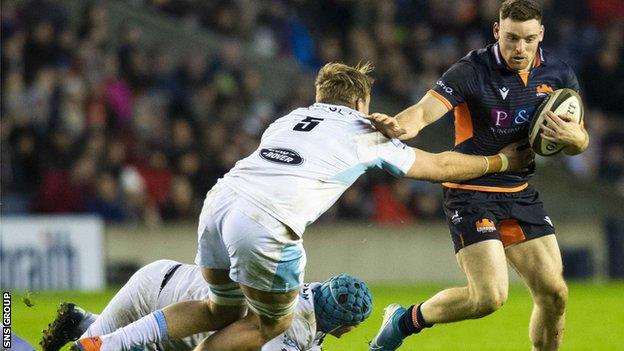How is rugby preparing to return?
- Published

The Pro14 season is likely to resume with local derbies like Glasgow v Edinburgh
After months in hibernation, sport is starting to resume. We have heard a lot about how football is planning to get back to normal, but what about rugby?
With strict government guidelines to adhere to during the Covid-19 pandemic and ongoing discussions around a new global rugby calendar, getting players back out on the field remains an ever-changing challenge.
Here's what we know.
'Bio safe' Murrayfield
With all professional players in Scotland currently on the government furlough scheme, no team training is taking place at the moment, but that could soon change. The general guidance from the sport's medical experts is players will need around 8-10 weeks of training before they are ready for match action.
Scottish Rugby intends to use Murrayfield Stadium as a training base for both Edinburgh and Glasgow Warriors. Risk assessments are currently ongoing to determine how players can observe social distancing measures in the initial phase of the return to training. The governing body is also making plans around Covid-19 testing, which would need to be in place before full-contact training could resume.
What about the Pro14?
Since suspending the Pro14 indefinitely in March, league officials have maintained throughout their preference to complete the existing 2019/20 season rather than bringing the campaign to a premature end. A board meeting is scheduled for next week and is likely to shed more light on how they plan to make that happen.
The target date for the return of the Pro14 is late August. Depending on any delays to the easing of lockdown restrictions, that could nudge any return back into September. The Scottish Government's guidelines allow for the return of top level rugby in phase two of the pandemic route map.
Local derbies behind closed doors are likely to be the first matches when the league does return, so we can expect at least one Edinburgh v Glasgow Warriors showdown at Murrayfield. If all goes according to plan to complete the 2019/20 campaign, the new season could be up and running in early October.
Will European competitions finish?
Glasgow being knocked out of the Champions Cup at the pool stage means they have no European commitments to worry about. Edinburgh, however, were due to have a quarter-final trip to France to face Bordeaux in the European Challenge Cup.
EPCR, who govern the European competitions, have targeted the weekend of 16/17 October to stage the Champions Cup and Challenge Cup finals in Marseille. That would presumably mean late September for any quarter-finals, though no dates have been confirmed and travel restrictions would have to be eased by then in order for Edinburgh to head to France for the last-eight tie.
When will Scotland play next?
Scotland's summer tour to South Africa and New Zealand has already been cancelled along with all other international summer Tests across the globe. Head coach Gregor Townsend has expressed hope those fixtures could take place later in the year, but how realistic that is remains to be seen.
The All Blacks, Argentina and Japan are due to travel to face Scotland at Murrayfield in the Autumn, although doubts now surround whether that series will proceed as planned. The Scots also have one outstanding match from the 2020 Six Nations, against Wales in Cardiff, to fit into their schedule.
Much will depend on whether teams are allowed to travel and if fans are allowed into the stadium. RFU chief Bill Sweeney has stated playing the November Tests behind-closed-doors makes little financial sense. With a huge chunk of their income derived from match-day revenues, the SRU are sure to feel similarly.
World Rugby and key stakeholders are trying to thrash out how to get some lucrative international matches played in November, and one option mooted is a Six Nations-style round robin between the home nations, should the Southern Hemisphere teams be unable, or unwilling, to travel north.